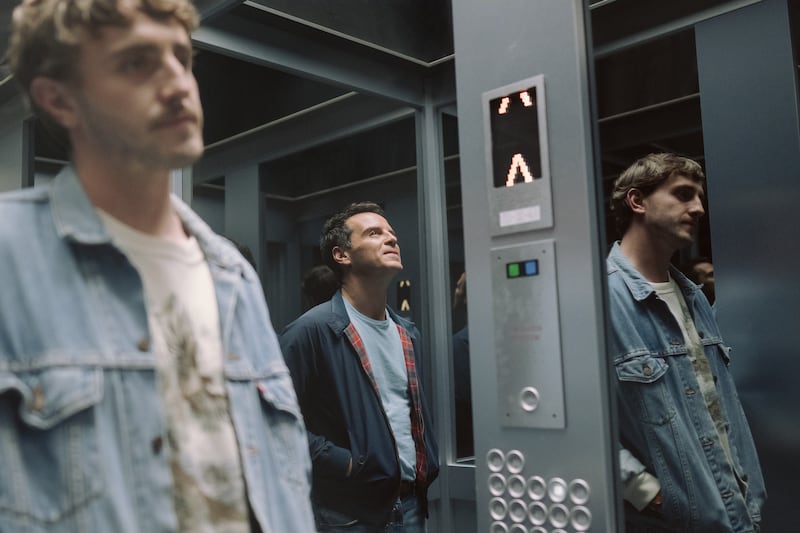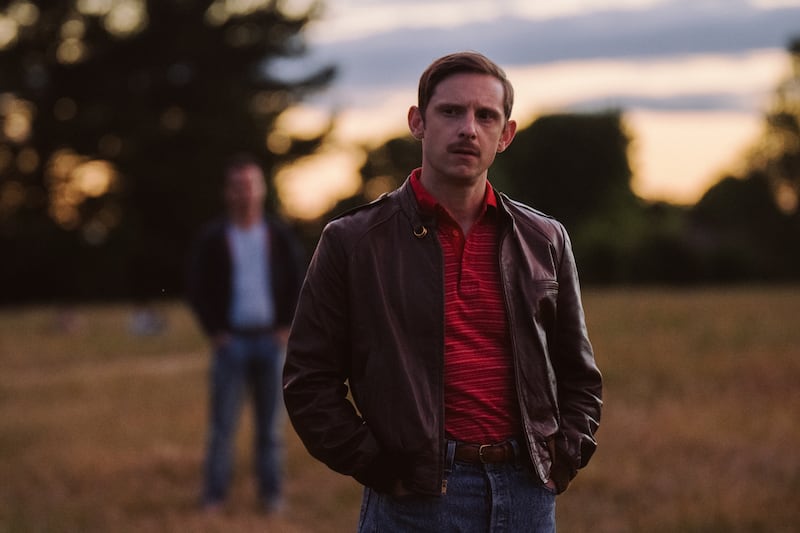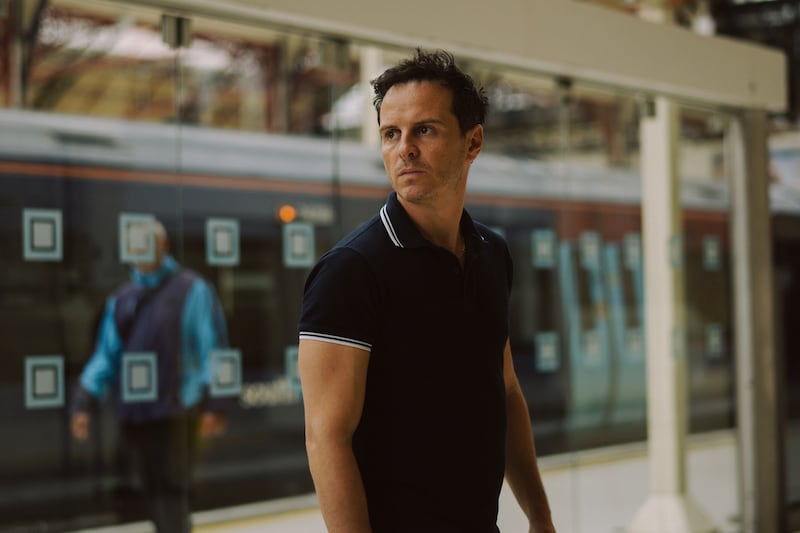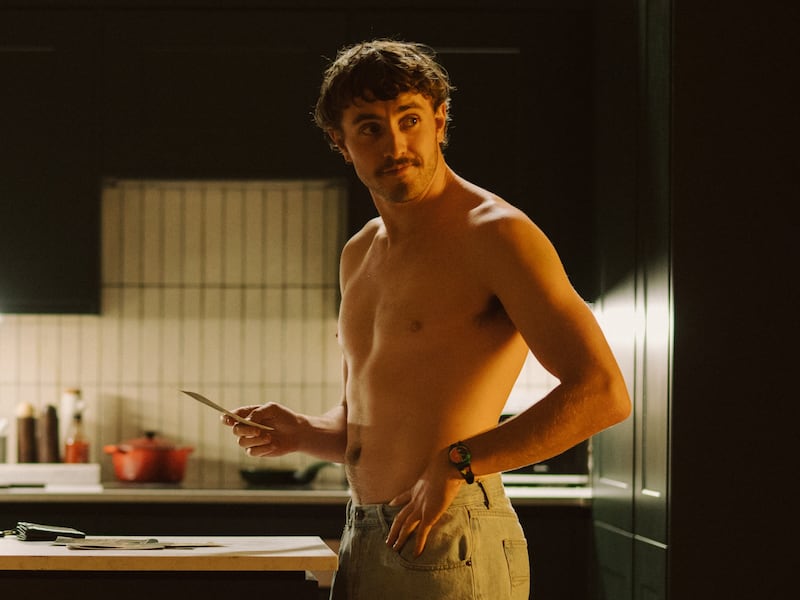All of Us Strangers (15, 105mins, drama)
Starring: Andrew Scott, Paul Mescal, Jamie Bell, Claire Foy
Director: Andrew Haigh
THERE’S much buzz about the ongoing bromance between Andrew Scott and Paul Mescal during the promotion for their new movie All of Us Strangers, a stylish and emotionally-charged human drama from writer/director Andrew Haigh (The North Water, Weekend) based on a novel by Taichi Yamada.
The chemistry that’s been so apparent on chat shows over the past few weeks – either the pair truly are besties, or we are being treated to the best performances of their ascendant careers – very much fuels the film itself, in which the top Irish stars play love-struck neighbours seeking refuge from their lonely existence in a mostly empty London high-rise.
Scott plays Adam, a screenwriter struggling with work and a ton of traumatic emotional baggage he’s been dragging around since childhood. The two elements meet head-on in Adam’s latest project, which finds him delving into his extraordinarily painful past for inspiration – with unexpected results.
We know less about Harry, (Mescal) a refugee from Leeds, who has the booze-tinged air of a lost soul about him despite the twinkle in his eye.

Having observed each other from afar, the confident and charismatic Harry is the first to initiate contact via a drunken late-evening knock on his more closely guarded neighbour’s door. The spark of attraction between the pair is immediately apparent even during this brief, awkward exchange. The encounter ends with a politely closed door, yet leaves a metaphorical one very much ajar.
Read more:
The pair are soon lovers, with their mutual physical tenderness and Harry’s empathetic nature providing the catalyst for Adam to gradually emerge from his shell emotionally, a process concurrent with the writer’s imaginings of a return to the suburban home of his childhood for a belated reunion with his parents.
Mum (Claire Foy) and Dad (Jamie Bell) appear just as they were the last time Adam saw them in 1987, when he was 12: now that all three are roughly the same age, they can actually have some of the emotionally difficult conversations that never happened first time around – including the ‘coming out’ experience which Adam was denied by a cruel twist of fate.

As the two storylines/timelines gradually progress and begin to converge, All of Us Strangers moves increasingly into dreamlike territory with a tinge of nightmarish dread slowly creeping in as Adam gets closer and closer to confronting the key trauma which has defined/confined his being.
It’s hugely emotional stuff that will strike uncomfortable chords with anyone who has ever struggled to communicate with their family, wished they had said and done things differently or lived with the ‘what-might-have-been’ and knock-on insecurity of losing loved ones too soon.

There are only four speaking parts in the entire film, which very much revolves around Scott, who features in each and every scene. He’s playing an introvert, but is blessed with the natural ability to convey underlying emotion with just a look or subtle physical movement, allowing Adam’s intense vulnerability to radiate off the screen.
It’s an incredibly affecting, heartbreaking turn, as we watch this deeply damaged man desperately attempting to escape from emotional purgatory and finally allow himself to be loved.

As Harry, Mescal provides an understated yet hugely engaged supporting turn as a burly yet empathetic guy committed to helping his partner struggle through the turbulence of coming to terms with his past. Expect memes/TikToks suggesting you ‘find someone who looks at you the way Harry looks at Adam’ to become a thing in the very near future.
Indeed, each actor delivers a superb, nuanced performance, with Jamie Bell particularly good as Adam’s superficially ‘blokey’ father, an emotionally restrained yet ultimately compassionate guy who defies stereotypes by being more immediately accepting of his son’s homosexuality than Adam’s mother.
Haigh’s artfully conceived film is concerned with the dangers of allowing the past to define the present, while simultaneously packing in plenty of era-defining pop music (Frankie, Pet Shop Boys, Erasure) and aesthetic touchstones (vinyl records, 1980s moustaches/perms and fashions, woodchip wallpaper, brown MFI kitchens) designed to evoke nostalgia.
This visually arresting piece also deliberately blurs the lines between late-20th and early-21st centuries as it switches between eras, underlining that these characters are products of the times they grew up in – it’s definitely not accidental that Harry’s fashion and facial hair choices skew-1980s – and building a dreamlike quality where the viewer is never quite sure what’s ‘real’ and what’s just taking place in Adam’s head until the point where all is revealed.
Some will be happier than others at the redemptive yet simultaneously devastating manner in which the story resolves, but only the hardest of hearts will come away with dry eyes as the credits roll.
As for Scott and Mescal, they definitely make quite the double act: while they and indeed All of Us Strangers itself might have been snubbed by the Academy Awards, hopefully we will be seeing more of this bromance for the ages at the Baftas next month.


